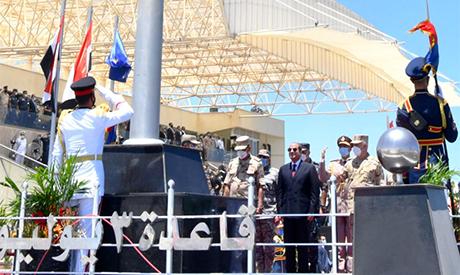
Egypt's President Abdel-Fattah El-Sisi during the inauguration of the 3rd of July naval base on Saturday 3 July 2021 (Photo courtesy of the Egyptian presidency)
Negotiations with Addis Ababa over its disputed Grand Ethiopian Renaissance Dam (GERD) should not go on indefinitely, Egypt's President Abdel-Fattah El-Sisi said, five days before the United Nations Security Council's (UNSC) anticipated session on the decade-long row.
Egypt's approach in the negotiations with Ethiopia over the past ten years has been based on the necessity of reaching a legally binding agreement on the dam in accordance with international norms and constants, El-Sisi said Saturday during a lunch banquet following the launch of a military drill at a newly-opened naval base in the country’s northwest coast.
Egypt, El-Sisi stressed, has never threatened any country directly or indirectly throughout history despite its great military power.
"Part of such military capabilities was shown at the Qader 2021 Maneuver," he added, according to a video released by the Egyptian presidency’s official website.
The president also extended thanks to "all friendly countries over their mediation efforts to settle the GERD issue."
The downstream countries, Egypt and Sudan, have been negotiating in vain with upstream Ethiopia for a decade to reach an agreement over the multi-billion dollar hydropower dam, which is under construction since 2011 on a main tributary of the Nile river, the crucial source of water to Cairo and Khartoum.
The UNSC is set to hold a session over the long-running issue on Thursday at a request from Cairo and Khartoum as the two countries say the controversial project will threaten the regional security and stability if Addis Ababa fills the dam this summer as announced despite the lack of accord.
Addis Ababa plans to fill the dam for the second time in July with 13.5 billion cubic metres of water without agreement with Cairo and Khartoum.
The UNSC's session is not the first about the crisis, as the 15-member body held a session in June 2020 at Egypt's request due to what Cairo described as Ethiopia's "intransigence" in negotiations.
During the session, the council urged the three countries to reach a consensus and warned against unilateral actions.
The three countries agreed to continue negotiations under the aegis of the African Union, but Ethiopia held 4.9 billion cubic metres of water behind its dam a month later without coordinating with Egypt and Sudan.
Egypt, which depends on the Nile for over 95 percent of its freshwater, does not oppose the dam but fears the dam will affect its water share if a legally binding deal is not reached.
Sudan also fears the GERD will put the operation of its Roseires Dam and the lives of 20 million Sudanese citizens at “a very high risk” in the absence of a binding deal.
Short link: